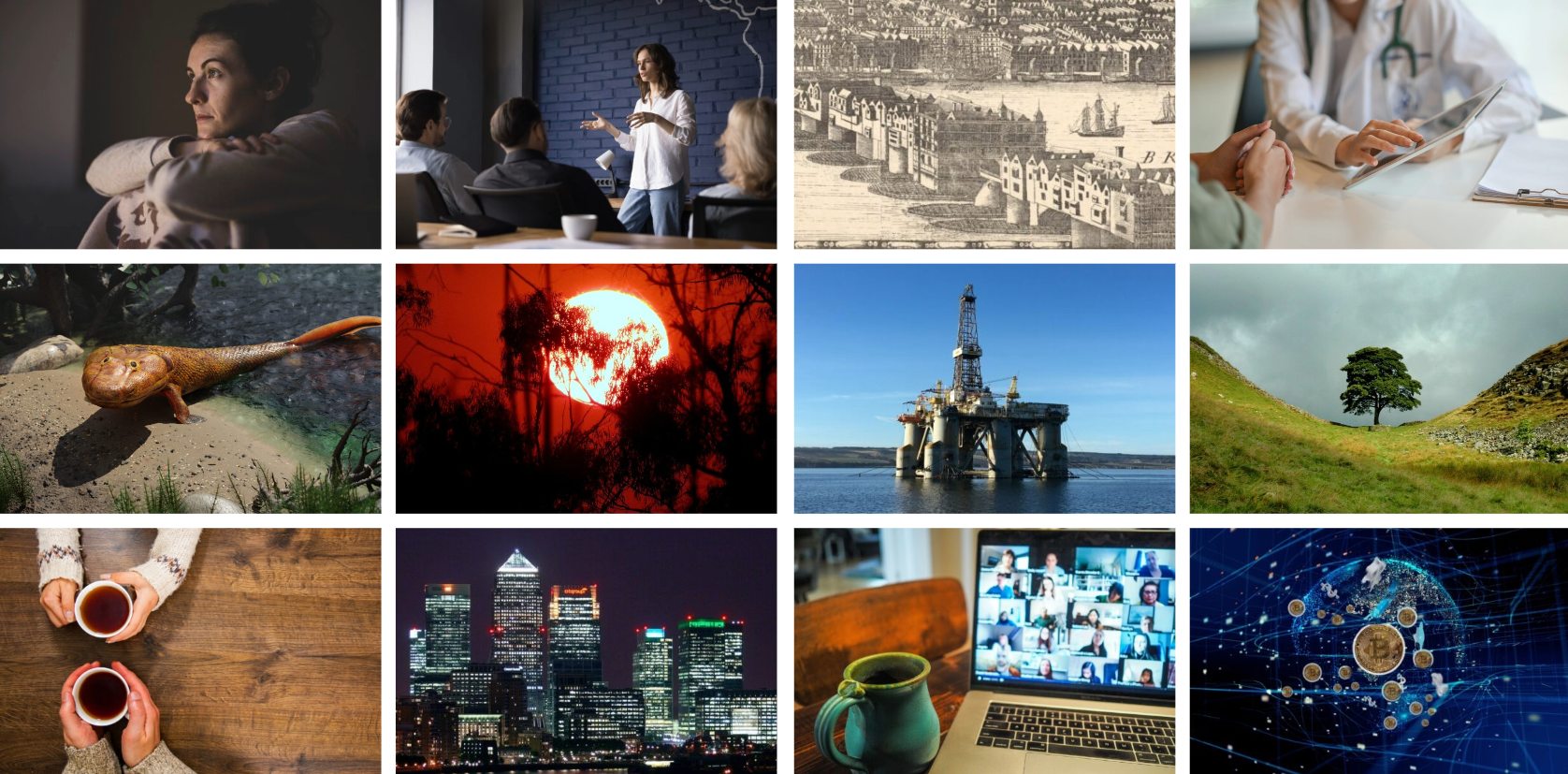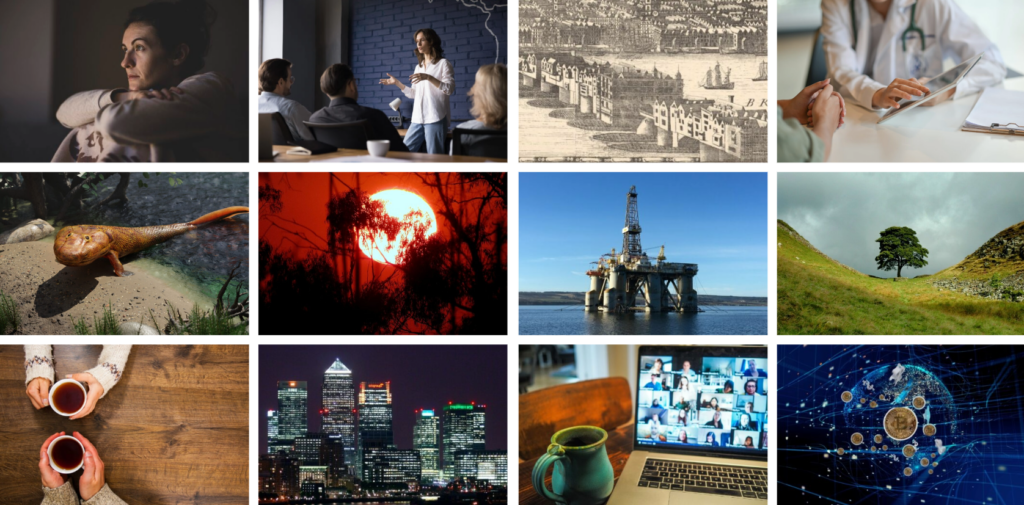In 2023, researchers at the University of Reading published 57 articles on The Conversation. Together, these have been read over 2.7 million times.
Here you can find the top three most read articles for each of the University’s research themes – from health advice and discussion, to the importance of our accents, climate science, and the case for the four day working week, these are the most read Reading research topics of 2023. The articles are republished on our Connecting Research blog under the Creative Commons (BY-NC) licence.
Agriculture, Food & Health
Depression isn’t just sadness – it’s often a loss of pleasure – Ciara McCabe, Professor of Neuroscience, Psychopharmacology and Mental Health
It’s often thought that if someone is depressed, they will feel sad or low most of the time. But what many don’t realise is that these aren’t the only symptoms of depression. Another common symptom of depression that is sometimes overlooked is the feeling that you no longer find the things you used to enjoy to be interesting or pleasurable. Read more.
Flavanols are linked to better memory and heart health – here’s what foods you can eat to get these benefits – Professor of Nutrition and Food Science
There are plenty of good reasons to make sure you’re eating enough fruit and vegetables each day. Not only do fruit and vegetables contain many of the important vitamins and minerals our body needs to function at its best, they also keep our gut healthy and may even help maintain a healthy weight. Read more.
Young-onset Alzheimer’s can be diagnosed from as early as 30 – and the symptoms are often different – Associate Professor in Cellular Neuroscience
Alzheimer’s disease is often thought of as a condition that only affects the elderly. But around 3.9 million people worldwide aged 30-64 live with young-onset Alzheimer’s disease – a form of dementia in which symptoms appear before the age of 65. Read more.
Heritage & Creativity
Why some people lose their accents but others don’t – linguistic expert – Jane Setter, Professor of Phonetics
The way a person speaks is an intrinsic part of their identity. It’s tribal, marking a speaker as being from one social group or another. Accents are a sign of belonging as much as something that separates communities. Read more.
Straw bale hung from London’s Millennium Bridge to comply with ancient law – just part of the River Thames’ long, legal history – Richard Blakemore, Associate Professor in Social and Maritime History
Maintenance workers on London’s Millennium Bridge – which spans the River Thames –have hung a bale of straw from the bridge’s undercarriage. Read more.
The Sycamore Gap: four other significant tree destructions from history – Helen Parish, Professor of History
The felling of a single sycamore tree prompted an outpouring of grief last week. The tree – known as the “Sycamore Gap” – had been an iconic landmark and its location, Hadrian’s Wall in Northumberland, is a protected Unesco world heritage site. Read more.
Environment
How fish evolved to walk – and in one case, turned into humans – Chris Organ, Associate Professor of Evolutionary Biology
When you think about human evolution, there’s a good chance you’re imagining chimpanzees exploring ancient forests or early humans daubing woolly mammoths on to cave walls. But we humans, along with bears, lizards, hummingbirds and Tyrannosaurus rex, are actually lobe-finned fish. Read more.
Research reveals who’s been hit hardest by global warming in their lifetime – and the answer may surprise you – Ed Hawkins, Professor of Climate Science (with co-authors)
Earth is warming and the signs of climate change are everywhere. We’ve seen it in the past few weeks as temperatures hit record highs around the world – both in the Northern Hemisphere and the warm Australian winter. Read more.
Science shows the severe climate consequences of new fossil fuel extraction – Ed Hawkins, Professor of Climate Science
The world has just suffered through its warmest month ever recorded. Heatwaves have swept across southern Europe, the US and China, breaking many temperature records in the process. Read more.
Prosperity & Resilience
Why banks once flocked to Canary Wharf’s high-tech superstructures, but are now starting to return to the City – Professor in Business History and Professor of International Business History
HSBC is moving its UK headquarters from Canary Wharf back into the City of London as it adjusts to the impact of hybrid work on its office space needs. Read more.
The UK’s four-day working week pilot was a success – here’s what should happen next – Associate Professor of Finance and Co-Director of Equity, Diversity, and Inclusion at Henley Business School
The world’s largest four-day working week trial has just ended and almost all of the companies that participated have decided to continue with a reduced working hours model. Read more.
What Binance’s US lawsuit says about the future for cryptocurrency regulation – Professor of Finance & Financial Technology (with co-author)
The world’s largest cryptocurrency exchange, Binance, has been hit with a lawsuit by US regulator the Commodity Futures Trading Commission (CFTC). This is not the first time a cryptocurrency exchange has been charged by a regulator. But this particular case involves a regulator that does not directly oversee cryptocurrencies. This indicates how regulators – particularly those in the US – hope to clamp down on the cryptocurrency industry. Read more.
Enhancing public understanding of research
The Conversation’s readership is largely non-academic, which means that writing for this platform enhances public understanding of research and can build the profile of academic work with new audiences and decision makers – including managers, chief officers, educators, health practitioners, and those working in media, policy or government. Because articles on The Conversation are open access, they can be shared and republished by other outlets, increasing their reach even further.
 Articles on The Conversation combine academic expertise with a journalistic approach – they can be responses to events in the news, discussions of new research, or explorations of broader topics or themes anchored in recent events.
Articles on The Conversation combine academic expertise with a journalistic approach – they can be responses to events in the news, discussions of new research, or explorations of broader topics or themes anchored in recent events.
You can pitch to The Conversation directly or through our Press Office (contact pressoffice@reading.ac.uk).


